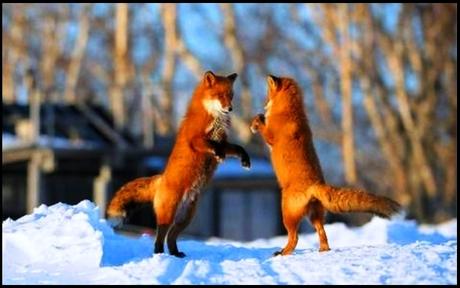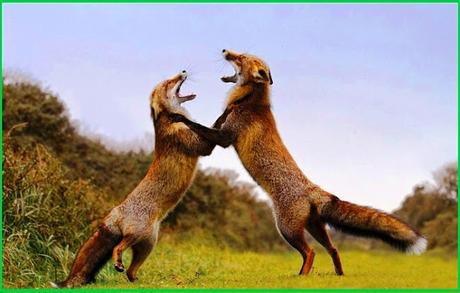We've gotten to be pretty useful with our forelegs though, more so than any other species on the planet. We learned how to make tools and clothes, how to dress ourselves, how to tear our hair out, how to draw, paint, write, play musical instruments, pick our noses, drive cars, fire guns and press nuclear buttons.
Of course this week's theme of Four Legs Good (which I've wilfully misinterpreted so as not to repeat what others have already written) derives from a slogan coined by George Orwell - 'Four legs good, two legs bad' - in his political allegory of the Russian Revolution, Animal Farm, a story in which the animals of Manor Farm rebel against their two-legged overlord, Farmer Jones.
Orwell, born Eric Blair in India in 1903, chose his pen name for his love of the Suffolk river Orwell. He could conceivably have gone for Horatio Stour or Rudyard Gipping (for the Stour and the Gipping lie in close proximity), only he didn't - and that's enough about him for now, although he remains one of my favorite English authors of the mid-20th century.
In his famous farm fable, Orwell wrote about how the pigs, leaders of the revolution, gradually became more like the oppressors they had overthrown as power began to corrupt their ideals. The slogan was amended to read 'Four legs good, two legs better' as the pigs took to aping men (ding! - pun intended) by strutting around upright on their rear trotters - a wicked satire, though fanciful, of course.
It got me researching four-legged creatures that actually do stand on their hind legs at times so as to put their forelegs to good purpose. The list is a long one, when you think about it: bears, meerkats, squirrels among the most obvious. I knew about hares boxing on hind legs but I was intrigued to discover that foxes do the same.

Fox Boxing Day!
They rear up on hind legs and face off in feats of strength, usually resting their forelegs on their opponent's chest or shoulders and pushing as hard as they can. In truth, it's probably closer to wrestling than boxing - and even closer to plain shoving, but fox boxing has a ring to it (ding again!) so I'm going to stick with the more resonant phrase.Cubs acquire this behavior as early as ten weeks old; it forms part of their learning play, is used to settle sibling squabbles and to establish a hierarchy. Male foxes occasionally indulge in the practice to settle territorial disputes (though they more commonly resort to ground-level tussles involving much rolling and nipping).
Sometimes a dog fox and vixen act in this way (as photographed above) and the almost dance-like quality of such performances has given us the term foxtrot for the lively ballroom dance consisting of quick and slow steps. However, I was delighted to learn that fox boxing is most common among vixens. Go bitches!

Vixens Mixing It!
The females of the species resort to fox boxing to settle domestic squabbles, competition for male attention and general uppityness. The rules of the game appear to be very simple: you rear, you engage, you snarl (as shown above) and you just keep pushing until one or other fox falls over. A single fall or submission decides the bout; last fox standing wins; and there is rarely any physical injury sustained, merely loss of pride for the loser.I thought I'd have a go at writing a poem about boxing foxes with foxgloves off, inspired by my research - but it's not made the cut, so will get completed at a later date. In its place, I hope this is an adequate substitute, from the wonderful John Clare (1793-1864).
The Vixen
Among the taller wood with ivy hung
The old fox plays and dances round her young.
She snuffs and barks if any passes by
And swings her tail and turns prepared to fly.
The horseman hurries by: she bolts to see
And turns again, from danger never free.
If any stands she runs among the poles
And barks and snaps and drives them in the holes.
The shepherd sees them and the boy goes by
And gets a stick and progs the hole to try:
They get all still and lie in safety sure
And out again when safety is secure
And start and snap at blackbirds bouncing by
To fight and catch the great white butterfly.
Thanks for reading. Have a happy Bank Holiday weekend, S ;-) Email ThisBlogThis!Share to TwitterShare to Facebook
Reactions:
